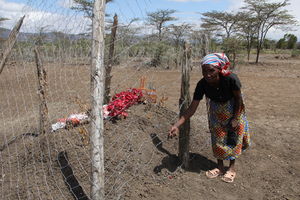Bountiful harvest for Makueni farmers after installing solar fence

Petronilla Muthama harvests mangoes at her farm in Kathiani, Makueni County on December 6, 2022. She is among farmers who have embraced fruit farming in the region bordering Chyullu Hills National Park.
What you need to know:
- It took a solar powered fence installation powered by the county government of Makueni in partnership with the David Sheldrick Wildlife Trust to keep the elephants at bay.
- Residents now have a peace of mind. The region bordering Chyulu Hills National Park is now one of the biggest producers of food and assorted tropical fruits.
Petronilla Muthama is a happy farmer. Even before the onset of the mango season in Makueni County, her mango trees are producing fruits in abundance and the monetary return is also promising. Her home borders the Chyulu Hills National Park and for years, wild animals have been benefiting from her fruits more than she did.
Petronilla previously operated a vibrant shop in Nairobi’s downtown where she sold designer shoes and clothes before the agribusiness bug bit her. The enterprise was booming until the Covid-19 pandemic struck. The resulting economic crunch pushed the trained insurance underwriter to the countryside. She opted to start a mangoes and pixie orchard.
“Initially, this region was unsuitable for growing fruits because of the rampant invasion by elephants. This has since changed. We are getting more value in growing fruits than in cultivating maize,” she told Healthy Nation.
It took a solar powered fence installation powered by the county government of Makueni in partnership with the David Sheldrick Wildlife Trust to keep the elephants at bay.
Residents now have a peace of mind. The region bordering Chyulu Hills National Park is now one of the biggest producers of food and assorted tropical fruits.
Petronilla has a borehole, which sustains the fruits sitting on 10 acres through the dry spell. The irrigation enables her to regulate the flowering of the fruit trees. This is how she is guaranteed of a crop before the onset of the conventional season.
“To run an orchard of this size requires constant attention. Three workers assist us to tend the orchard. We sell directly to exporters who make a beeline at the orchard and book fruits slightly before they are mature. A piece goes for at least Sh30,” she said.
The success story is replicated across the entire region overlooking Chyulu Hills National Park. In Mbotela Village, for instance, a Nairobi-based medic has established an enviable empire in fruit farming. Dr John Muma grows pixie mandarins, mangoes, bananas and butternuts on a 10-acre plot. He also keeps modern beehives.
“We grew up assuming that this region was unsuitable for fruits. We were wrong. The pixie I planted in 2018 produced their first harvest last year. They yielded 500 kilos. We expect a ten-fold increase in yield this year,” he said.
Dr Mumo and Ms Muthama are members of a vibrant group of local conservationists who are determined to restore the region bordering Chyulu Hills National Park.
Buoyed by the changing economic fortunes in the area, the lobby Dubbed Chyulu Development Forum is mainly involved in growing trees. The group banks its hope on the young generation to restore the area, which was once the envy of Ukambani in terms of food production.
“Six of our members have established vibrant tree nurseries and are earning tidy sums of money from the ventures,” said Mwaniki Mwololo, the chairman of Chyullu Development Forum and a Makueni County government administrator.
Many of the tree nurseries stock fruit trees. With the electric fence, the residents are convinced that the elephant menace is behind them.
But the region is awash with stories of environmental destruction. In the 1990s, for instance, droves of unscrupulous traders drove all the way from Nairobi to the region, where they would make a fortune in charcoal trade. They descended on mature umbrella thorn acacia trees that dotted the sprawling park. Experts linked the unabated deforestation to depressed rainfall experienced in the region in subsequent years, reduced crop production in the neighbouring farmlands and increased elephant-human conflict.
Attempts by the government to restore the water catchment area, which supports many streams and rivers by kicking out communities living in and on the hedge of the park, did not bear fruit. It took the installation of the electric fence to turn things around. With focus now shifting to growing fruits, the park is also at peace
“We have established that the emergence of a vibrant fruit belt along Chyulu Hills National Park has eased pressure on the park. Those who eke out a living by jumping over the electric fence to access forest resources have significantly reduced,” said Evans Maneno, the head of Kenya Forest Service in Makueni County.





